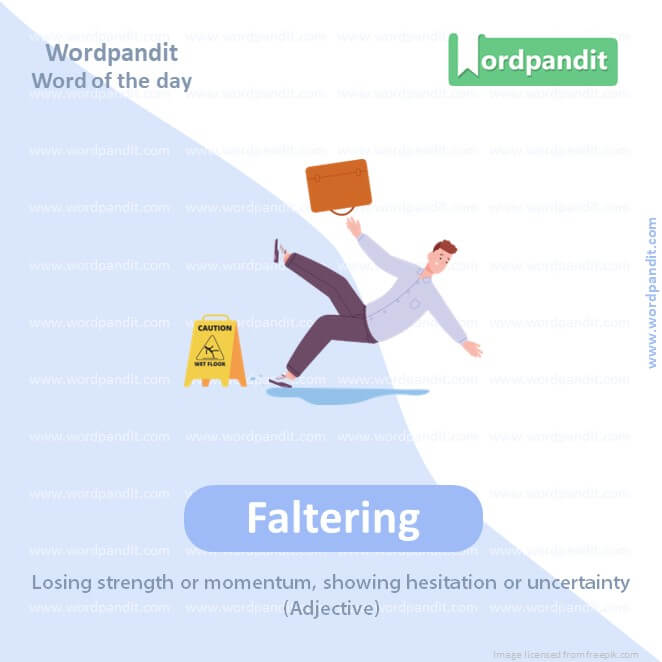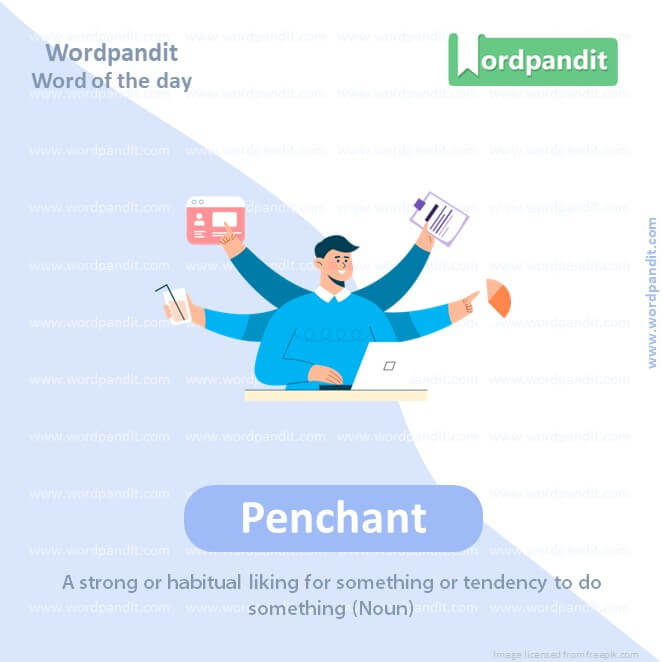Daily Vocabulary Words: List of Daily Used Words in Leading International Newspapers
Hi there. Welcome to this special section @ Wordpandit.
Our endeavour here is very simple: to highlight important daily vocabulary words, which you would come across in leading newspapers in the country. We have included the following newspapers in our selection:
• The New York Times
• The Washington Post
• Scientific American
• BBC
• The Guardian
• Psychology Today
• Wall Street Journal
• The Economist
We are putting in extensive work for developing your vocabulary. All you have got to do is be regular with this section and check out this post on a daily basis. This is your repository of words that are commonly used and essentially, we are posting a list of daily used words. Hence, this has significant practical application as it teaches you words that are used commonly in leading publications mentioned above.
Visit the website daily to learn words from leading international newspapers.

WORD-1: Pervasive
CONTEXT: it’s still far more pervasive than white Americans can easily appreciate.
SOURCE: Washington Post
EXPLANATORY PARAGRAPH: Imagine something like a smell or a color that is everywhere around you. You can find it in every corner, and it’s hard to avoid. That’s what ‘pervasive’ means. It’s like when the smell of cookies baking fills the whole house.
MEANING: Existing in every part of something or being spread throughout (Adjective).
PRONUNCIATION: puh-vey-siv
SYNONYMS: Ubiquitous, Prevalent, Omnipresent, Widespread, Rife
USAGE EXAMPLES:
1. The pervasive scent of lavender filled the garden.
2. There is a pervasive belief that education is key to success.
3. The movie’s influence was pervasive, affecting fashion and music.
4. He noticed a pervasive sense of happiness in the village.

WORD-2: Unionization
CONTEXT: Unions won some victories, and fear of unionization may have pushed some employers to increase pay.
SOURCE: New York Times
EXPLANATORY PARAGRAPH: Think about a group of friends deciding to make a team so that they can all help each other and make sure they are treated fairly. Unionization is like that but for people at work. They join together to form a ‘union’ to help and protect each other.
MEANING: The process of organizing workers into a union, a group that works together to achieve common goals (Noun).
PRONUNCIATION: yoo-nee-uh-nuh-zay-shuhn
SYNONYMS: Organization, Federation, Association, Coalition, Alliance
USAGE EXAMPLES:
1. The workers considered unionization to improve their work conditions.
2. Unionization can lead to better salaries and benefits.
3. The factory saw a push for unionization after the pay cuts.
4. Unionization efforts were met with resistance from the management.
WORD-3: Gratuitous
CONTEXT: a gratuitous recession could all too easily undo much of the progress we’ve made.
SOURCE: New York Times
EXPLANATORY PARAGRAPH: Imagine someone giving you extra candy for no reason at all. Gratuitous is like that; it’s when something extra is given or done without a clear reason or need.
MEANING: Given or done freely and unnecessarily, often more than what is usual or needed (Adjective).
PRONUNCIATION: gruh-too-i-tuhs
SYNONYMS: Unnecessary, Unwarranted, Unjustified, Excessive, Superfluous
USAGE EXAMPLES:
1. The movie was criticized for its gratuitous violence.
2. He offered a gratuitous apology, even though he wasn’t wrong.
3. The article included some gratuitous details about her personal life.
4. The compliments felt gratuitous and insincere.
WORD-4: Caucusgoers
CONTEXT: in honor of the freezing temperatures that caucusgoers are expected to brave.
SOURCE: New York Times
EXPLANATORY PARAGRAPH: Think of a big group of people in your neighborhood who meet to talk about whom they like for a leader, like choosing a class captain. Caucusgoers are these people who go to these meetings and talk about who they want to lead them.
MEANING: Individuals who attend a caucus, which is a type of meeting of supporters or members of a specific political party or movement (Noun).
PRONUNCIATION: kaw-kuhs-go-erz
SYNONYMS: Delegates, Members, Attendees, Participants, Supporters
USAGE EXAMPLES:
1. Caucusgoers gathered to discuss the upcoming election.
2. The candidate impressed a large number of caucusgoers.
3. Caucusgoers play a crucial role in the primary elections.
4. Many caucusgoers were first-time participants in the political process.

WORD-5: Faltering
CONTEXT: If Republicans get to autumn and Trump is their nominee and faltering badly, you will probably see some rose-colored glasses, “aah, if only we had nominated DeSantis instead, we should have given him a chance” wish casting emerging.
SOURCE: New York Times
EXPLANATORY PARAGRAPH: Imagine you’re learning to ride a bike and sometimes you wobble and almost fall. That’s like faltering. It means you’re not steady and might stop or make mistakes because you’re not sure or you’re feeling weak.
MEANING: Losing strength or momentum, showing hesitation or uncertainty (Adjective).
PRONUNCIATION: fawl-ter-ing
SYNONYMS: Wavering, Hesitating, Stumbling, Vacillating, Unsteady
USAGE EXAMPLES:
1. His confidence was faltering after several setbacks.
2. The faltering economy affected many businesses.
3. Her voice was faltering as she spoke about her childhood.
4. The team’s faltering start to the season was unexpected.

WORD-6: Penchant
CONTEXT: Trump has an unbelievable number of negatives going against him, from people’s potent memories of Jan. 6 to his own penchant for disaster and the fact that it will be very challenging for him to stick to the “Mr. Stable Genius” message for long.
SOURCE: New York Times
EXPLANATORY PARAGRAPH: Imagine you really love drawing and always choose to draw whenever you can. That’s your penchant. It means a strong liking or tendency towards something.
MEANING: A strong or habitual liking for something or tendency to do something (Noun).
PRONUNCIATION: pen-chuhnt
SYNONYMS: Inclination, Preference, Fondness, Affinity, Proclivity
USAGE EXAMPLES:
1. She has a penchant for exotic foods.
2. His penchant for making jokes lightened the mood.
3. The artist’s penchant for vibrant colors is evident in his paintings.
4. She developed a penchant for travel in her youth.
WORD-7: Propensity
CONTEXT: The thing to keep in mind about Trump is that he does scramble electoral math a little by drawing in the sort of low-propensity voter who has otherwise eluded Republicans.
SOURCE: New York Times
EXPLANATORY PARAGRAPH: Imagine you always find yourself eating snacks when you’re watching TV. That’s your propensity, which means a natural tendency to behave in a certain way.
MEANING: An inclination or natural tendency to behave in a particular way (Noun).
PRONUNCIATION: pruh-pen-suh-tee
SYNONYMS: Tendency, Inclination, Predisposition, Leaning, Proclivity
USAGE EXAMPLES:
1. He has a propensity to speak his mind, regardless of the situation.
2. There is a propensity for errors when working too quickly.
3. Her propensity for arriving late was well-known.
4. The software has a propensity to crash when overloaded.

WORD-8: Intensified
CONTEXT: He has intensified his multiyear campaign to undermine the rule of law and the democratic process.
SOURCE: New York Times
EXPLANATORY PARAGRAPH: Think about turning up the volume of your favorite song so it’s louder and more exciting. That’s like intensified. It means to make something stronger or more extreme.
MEANING: Made more intense, stronger, or more serious (Verb).
PRONUNCIATION: in-ten-suh-fahyd
SYNONYMS: Escalated, Heightened, Amplified, Strengthened, Deepened
USAGE EXAMPLES:
1. The debate intensified as both sides presented their arguments.
2. The storm intensified overnight, causing more damage.
3. His training intensified as the competition approached.
4. The colors in the painting intensified the emotional impact.
WORD-9: Ascendancy
CONTEXT: A lawmaker who voted to certify the 2020 election results, to ensure the ascendancy of Mike Johnson, a loyalist who was an architect of the attempt to overturn that election.
SOURCE: New York Times
EXPLANATORY PARAGRAPH: Imagine being the leader of a game and making all the rules. That’s like having ascendancy. It means being in a position where you have power or control over others.
MEANING: Occupation of a position of dominant power or influence (Noun).
PRONUNCIATION: uh-sen-duhn-see
SYNONYMS: Domination, Supremacy, Control, Predominance, Mastery
USAGE EXAMPLES:
1. The company gained ascendancy in the market.
2. His ascendancy in the political arena was rapid.
3. The ascendancy of digital media is undeniable.
4. Her intellectual ascendancy was recognized by her peers.
WORD-10: Conceding
CONTEXT: The burden of conceding because the integrity of the process is ultimately more important than the identity of the president.
SOURCE: New York Times
EXPLANATORY PARAGRAPH: Imagine you and a friend are racing, and you realize your friend is faster, so you stop and say, “You win!” That’s conceding. It means admitting that something is true or giving up in a competition or argument.
MEANING: Admitting that something is true or valid after first denying or resisting it; also, surrendering or yielding, especially in a contest or competition (Verb).
PRONUNCIATION: kuhn-seed-ing
SYNONYMS: Admitting, Acknowledging, Surrendering, Yielding, Giving in
USAGE EXAMPLES:
1. After a long debate, he was conceding the point.
2. The politician ended up conceding the election.
3. She is not known for conceding defeat easily.
4. Conceding the penalty was a turning point in the game.
Vocabulary Daily
Language learning is a beautiful yet complex dance, where ‘vocabulary daily’ connote the integral beats. These everyday words form the essence of most of our conversations and are the cornerstone of effective communication. However, a methodical approach is required to efficiently learn ‘vocabulary daily’.
One key approach to learning ‘vocabulary daily’ is consistency. Engaging with a few words every day consistently fosters better understanding and recall than sporadic cramming sessions.
Interactive tools can add a touch of excitement and ease to mastering ‘vocabulary daily’. Flashcards, word of the day calendars, language learning apps can make the learning experience fun and fruitful. These tools not only introduce new words but often provide a context of use, aiding your understanding.
Making ‘vocabulary daily’ a part of your daily life is a surefire success strategy. Incorporating these words into day-to-day conversations, writing, or social media interactions greatly enhances retention and usage. It also allows you to witness firsthand the impact of a rich vocabulary on the clarity of expression.
To effectively grasp ‘vocabulary daily’, always keep a learner’s curiosity. Explore books, news articles, music, and podcasts in the respective language. This exposure helps in absorbing the words in a real-world context, thus building a robust bond with ‘vocabulary daily’.
In conclusion, understanding ‘vocabulary daily’ is an ongoing process that necessitates consistency, interactive learning, practical application, and a learner’s curiosity. By following this comprehensive approach, the task of mastering ‘vocabulary daily’ becomes less of a chore and more of an enriching journey that can lead to eloquent and effective communication. So, step into the exciting world of ‘vocabulary daily’ and let it colour your language learning adventure with shades of clarity, confidence, and joy.













